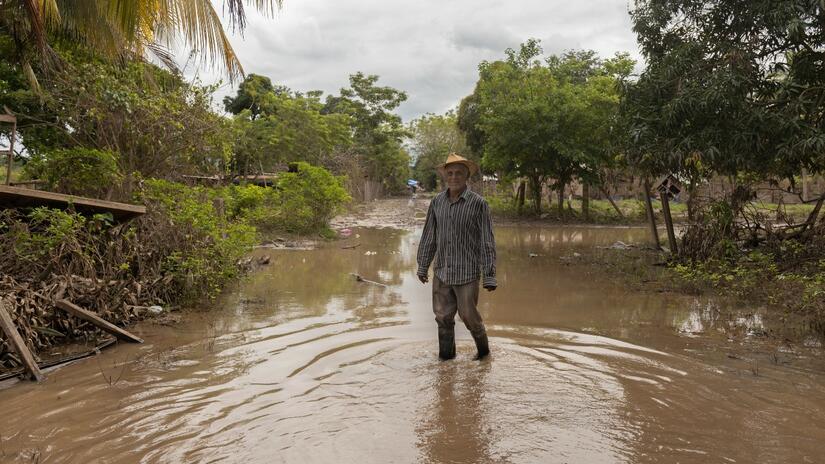Panama City, 11 November, 2021 - One year after Hurricanes Eta and Iota hit Central America, affecting more than 7.5 million people, the International Federation of Red Cross and Red Crescent Societies (IFRC) calls for urgent action and investment to protect millions of vulnerable people in Guatemala, Honduras and Nicaragua who are facing the combined impact of COVID-19, poverty, and climate-related disasters.
In Honduras alone, over 3 million people are now suffering from food insecurity, and 2.8 million people are in need of humanitarian assistance, over double the previous estimate issued in early 2020. Other communities in the region are facing the destruction of livelihoods such as fishing and farming has forced the most vulnerable families to choose between selling their assets to ensure their food security or reducing the number of daily meals.
Roger Alonso, IFRC’s Head of the Disaster, Climate and Crises Unit, said:
“In the last 12 months, the Red Cross teams in Guatemala, Honduras and Nicaragua have worked tirelessly to address the needs of more than 620,000 people affected by Eta and Iota. We have provided shelter, health care, psychosocial support, access to food, clean water, sanitation, and cash transfer services. However, the disaster is not over. Urgent action is needed now to protect people’s livelihoods, prevent diseases, and ramp up the recovery from the social and economic impact of the hurricanes, which have severely affected women, migrants and displaced people.”
In 2020, at least 1.5 million people were displaced in Central America as a consequence of disasters, including Hurricanes Eta and Iota: 937,000 in Honduras, 339,000 in Guatemala, and 232,000 in Nicaragua.
Eta and Iota have wiped out livestock and destroyed over 700,000 hectares of crops which are a critical source of livelihood and food security for many families already facing social exclusion and economic difficulties because of the COVID-19 pandemic, and pre-existent poverty levels. These adverse impacts have contributed to people’s decision to leave their homes or join ‘migrant caravans’ headed towards North America.
Martha Keays, IFRC’s Regional Director in the Americas, said:
“We need to act globally and locally before communities are displaced, and invest in climate adaptation and early action to combat the effect of disasters such as Eta and Iota. Guatemala, Honduras and, Nicaragua are classified as countries in high-risk of facing climate-related threats and, at the same time, are in the group of countries that lack investment to fund preparedness and adaptation measures. Humanitarian organizations, governments, civil society, donors, and climate experts should work together to revert that pattern and promote climate financing measures that save lives and empower communities, particularly those with the highest risks and the lowest capacities.”
In response to hurricanes Eta and Iota in Guatemala, Honduras and Nicaragua, the IFRC has launched an emergency appeal for 20 million Swiss francs to save lives, deliver humanitarian aid, and put in place preparedness plans and climate change adaptation measures that build community resilience and minimize the impact of future disasters.
In November 2020, the IFRC also activated its Disaster Relief Emergency Fund (DREF) to deliver fast and effective humanitarian aid for over 26,000 people affected by Eta or Iota in Belice, Colombia, Costa Rica and Panama.
For more information:
Susana Arroyo Barrantes, [email protected] + 506 8416 1771
María Victoria Langman, [email protected] +507 65501090

